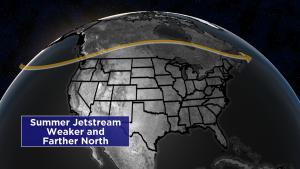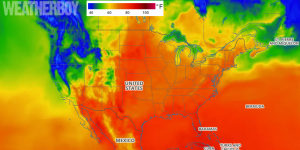
A dramatic change in the weather pattern will lead to a dramatic warm-up in the East, with a potentially dangerous heat wave coming to a region that hasn’t seen much heat this year yet. While meteorological summer arrived last week on June 1, it appears summer-like conditions will arrive this weekend and hang around through at least mid week next week in the Mid Atlantic and Northeast. Near record high temperatures are possible for the heavily populated area between Washington, DC and New York City, NY on Monday, Tuesday, and Wednesday.
Known as a Bermuda High pressure system, an area of high pressure will build across the southeastern United States and settle off-shore between the US and Bermuda. This Bermuda High will keep a southwesterly flow across the Mid Atlantic, helping usher in a dramatically warmer and more moist air mass. This will be the warmest air mass in the region for 2017 to date.
High temperatures will rise each day beginning this weekend. Highs in places like Philadelphia, PA will be 86 on Saturday, 92 on Sunday, and 96 on Monday. Some places in the eastern United States may even approach 100 degrees.
In addition to rising temperatures, dewpoints will rise too. Technically, a dewpoint is the temperature below which water droplets begin to condense and dew can form. The higher the dewpoint as it relates to temperature, the higher the humidity is and the more uncomfortable it begins. In places like Philadelphia, PA, the dewpoints will rise from the upper 50’s on Saturday to the upper 60’s by Tuesday.

The combination of high heat and humidity will create a high heat index. The heat index, also known as the apparent temperature, is what the temperature feels like to the human body when relative humidity is combined with the air temperature. When the body gets too hot, it begins to perspire or sweat to cool itself off. If the perspiration is not able to evaporate, the body cannot regulate its temperature. Evaporation is a cooling process; when perspiration is evaporated off the body, it effectively reduces the body’s temperature. When the atmospheric moisture content, measured as relative humidity, is high, the rate of perspiration from the body decreases. In other words, the human body feels warmer in humid conditions.
It is likely that urban areas in the Mid Atlantic, such as Philadelphia, will reach Heat Advisory Criteria. As such, the National Weather Service may issue various advisories in the eastern US ahead of the heat wave.
Unlike the pattern that brought cool and damp conditions to the region this week, there doesn’t appear to be too many chances for relief during this upcoming hot period due to that Bermuda High pressure system. While some isolated, scattered showers and storms could form as a result of the excess heat and humidity, no widespread rain is expected from the period Saturday through Wednesday.